Interested in enhancing the performance of your business? We’re here to help with vital tips for maintaining your heat pump.
Regular maintenance is key to keeping your heat pump running smoothly and efficiently. In this article, we’ll share practical tips on:
- Cleaning air filters
- Lubricating fan motors
- Clearing condensate drains
- Adjusting thermostat settings
- Ensuring proper refrigerant levels
By following these tips, you’ll be able to serve your customers better with a well-maintained heat pump system.
Key Takeaways
- Regular maintenance is important for optimal performance and longevity of heat pumps.
- Cleaning and inspecting air filters regularly improves system performance and extends its lifespan.
- Checking and lubricating fan motors helps identify signs of wear and tear and enhances efficiency.
- Proper lubrication of fan motors ensures smooth operation and prevents motor malfunctions.
Importance of Regular Maintenance
Regular maintenance is crucial for ensuring the optimal performance and longevity of our heat pumps. It’s important to understand the importance of professional maintenance in order to keep our systems running smoothly.
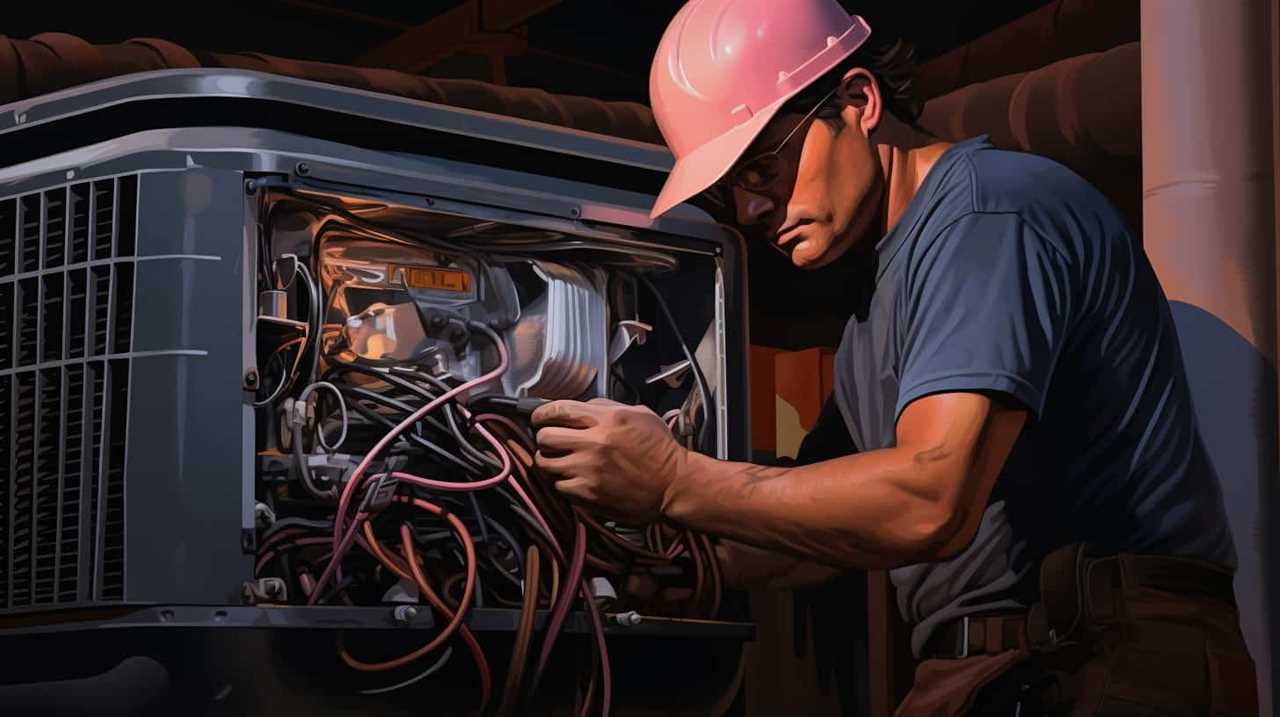
By investing in professional maintenance services, we can identify and address any potential issues before they become major problems. This not only helps to prevent costly repairs down the line but also ensures that our heat pumps are running at their most efficient, saving us money on energy bills.
Additionally, professional maintenance allows us to benefit from cost-effective maintenance strategies. These strategies may include regular filter changes, cleaning coils, and lubricating moving parts.
Cleaning and Inspecting Air Filters
To ensure optimal performance and efficiency, we should regularly clean and inspect our air filters. Air filters play a crucial role in maintaining good indoor air quality and preventing dust and debris from entering the system.
Over time, these filters can become clogged with dirt, reducing airflow and causing strain on the heat pump. By cleaning or replacing the air filters, we can improve the system’s performance and extend its lifespan.

It’s recommended to clean or replace the air filters every one to three months, depending on the environment and usage. Regular air filter maintenance not only ensures better air quality but also helps in reducing energy consumption and improving overall system efficiency.
Now, let’s move on to the next section, where we’ll discuss checking and lubricating fan motors for optimal performance.
Checking and Lubricating Fan Motors
When it comes to maintaining heat pump efficiency, proper fan motor maintenance is essential. Regularly checking and lubricating the fan motors ensures optimal performance and helps prevent motor malfunctions.
Proper Fan Motor Maintenance
As we continue our discussion on proper fan motor maintenance, it’s essential to regularly check and lubricate the fan motors. This will help ensure their optimal performance and prevent any potential issues. Here are three important steps to follow:
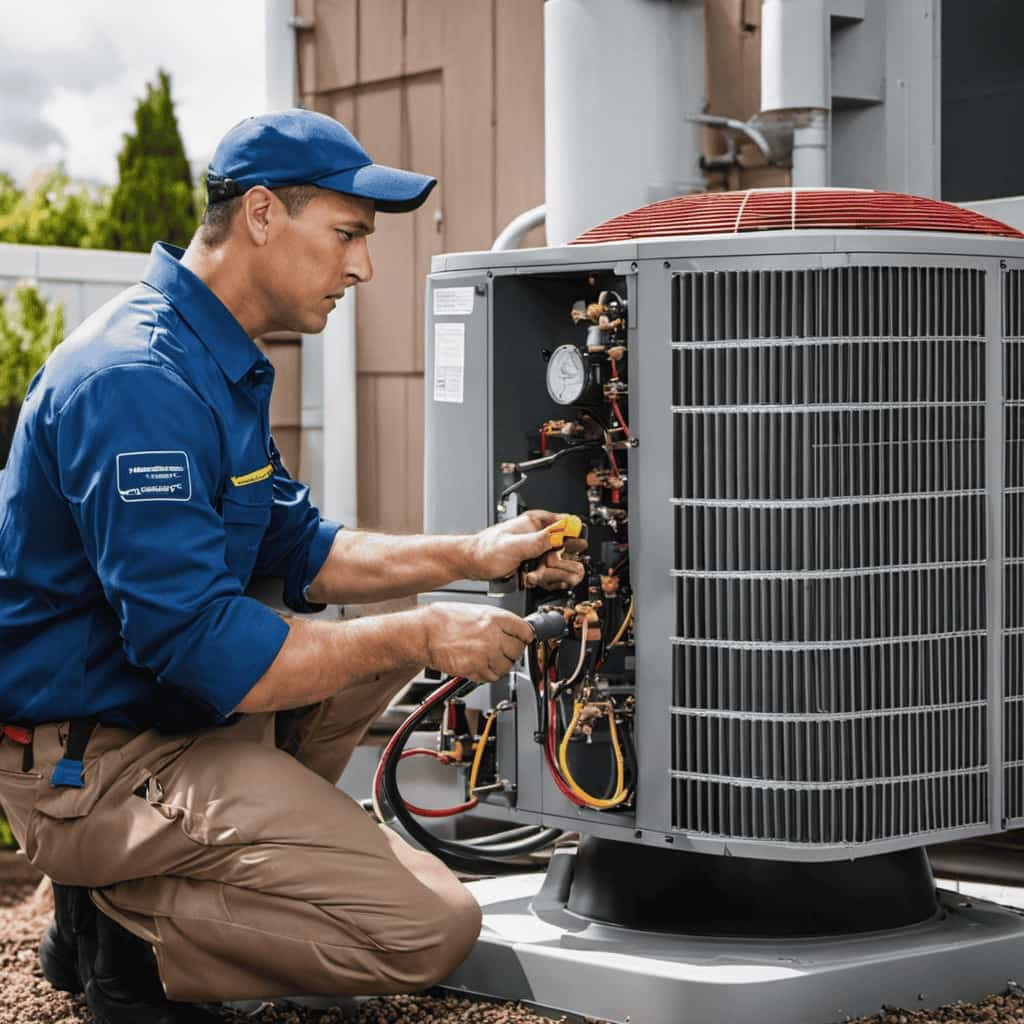
-
Fan Motor Troubleshooting: Before performing any maintenance, it’s crucial to identify any common fan motor issues. This may include unusual noises, poor airflow, or the motor not starting. By troubleshooting these problems, you can address them effectively and prevent further damage.
-
Regular Inspection: Regularly inspecting the fan motors is crucial for identifying any signs of wear and tear. Look for loose or damaged components, worn-out belts, or any signs of overheating. Addressing these issues promptly will help prevent costly repairs down the line.
-
Lubrication: Proper lubrication is vital for the smooth operation of fan motors. Use the manufacturer’s recommended lubricant and apply it to the motor bearings regularly. This will help reduce friction, extend the motor’s lifespan, and enhance its efficiency.
Lubrication for Optimal Performance
To ensure optimal performance of our fan motors, we regularly check and lubricate them. Proper lubrication is crucial for the smooth operation of the motors and helps prevent excessive wear and tear. When performing heat pump maintenance, it’s important to follow the recommended lubrication techniques.

First, make sure to use the correct type of lubricant specified by the manufacturer. This will ensure compatibility and maximize the effectiveness of the lubrication.
Next, apply a small amount of lubricant to the oil ports or lubrication points of the fan motor. Be careful not to over-lubricate, as this can cause issues with the motor.
Regularly inspect the fan motor for any signs of excessive noise or friction, as this may indicate the need for lubrication.
Preventing Motor Malfunctions
To prevent motor malfunctions, we regularly check and lubricate the fan motors. This is an essential part of motor troubleshooting and motor repair. Here are three important steps to follow:

-
Visual Inspection: We visually inspect the fan motors for any signs of damage or wear. This includes checking for loose or frayed wires, bent fan blades, or excessive dirt and debris.
-
Cleaning: We clean the fan motors to remove any dirt, dust, or debris that can affect their performance. This ensures proper airflow and prevents overheating.
-
Lubrication: We lubricate the fan motors using the manufacturer-recommended lubricant. This helps reduce friction and wear, extending the lifespan of the motor.
Regularly checking and lubricating the fan motors is crucial for preventing motor malfunctions and ensuring optimal performance.
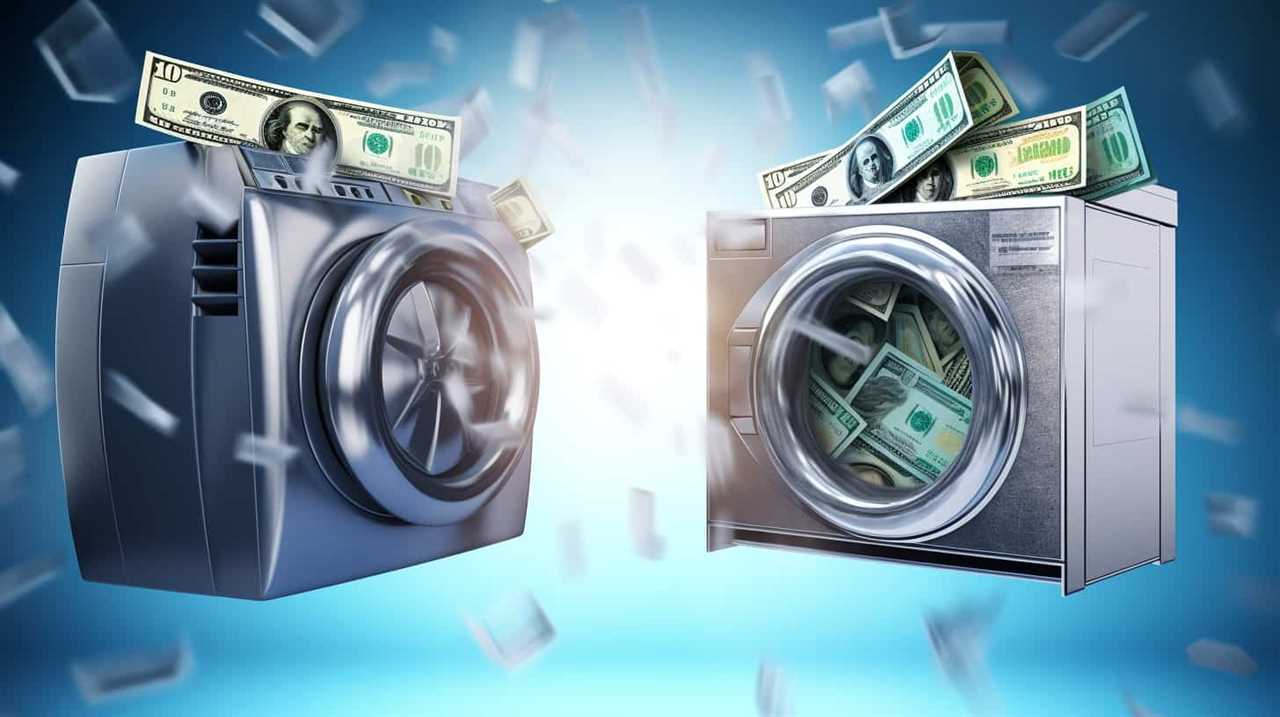
Once this step is complete, we can move on to clearing and inspecting condensate drains, which is the next topic we’ll discuss.
Clearing and Inspecting Condensate Drains
How can we ensure the efficiency of our heat pump system by clearing and inspecting condensate drains? Regular maintenance of condensate drains is essential to prevent drain blockage and potential water damage. By taking the time to clear and inspect the drains, we can avoid costly repairs and ensure that our heat pump system operates at its optimal level.
To help you with this task, here are some practical tips and steps to follow:
| Step | Description |
|---|---|
| 1 | Turn off the heat pump system |
| 2 | Locate the condensate drain pipe |
| 3 | Clear any debris or blockage using a small brush or vacuum |
| 4 | Inspect the drain pan for cracks or leaks |
| 5 | Pour a mixture of bleach and water to remove any mold or algae buildup |
Inspecting and Adjusting Thermostat Settings
Our team should regularly check and adjust the thermostat settings to ensure optimal efficiency of the heat pump system. Proper thermostat calibration and temperature control strategies play a crucial role in maintaining a comfortable and energy-efficient environment.
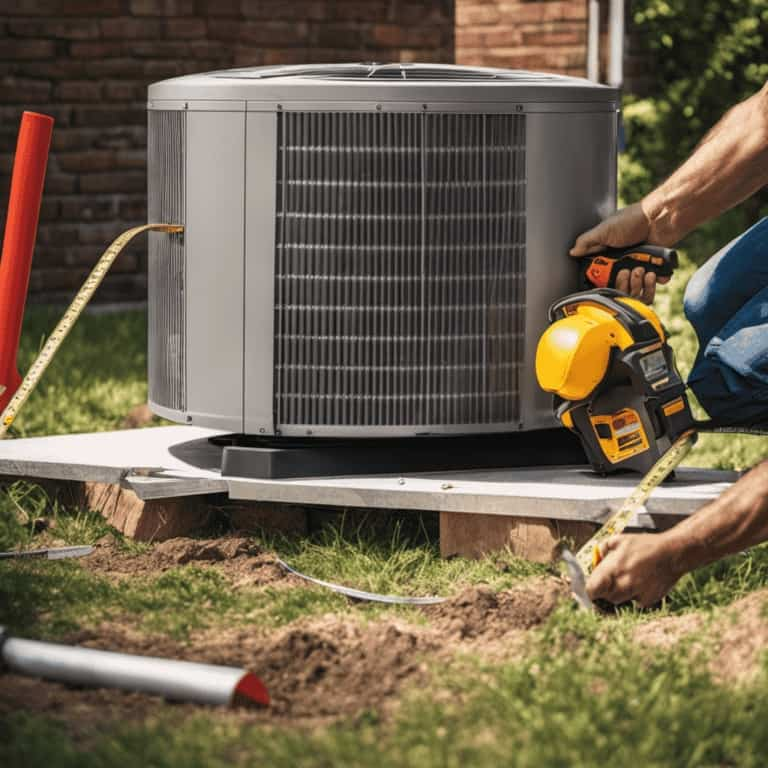
Here are three essential tips for inspecting and adjusting thermostat settings:
-
Check the accuracy: Use a separate thermometer to compare the temperature reading on the thermostat and ensure it’s accurate. If there’s a discrepancy, consider recalibrating the thermostat or replacing it if necessary.
-
Adjust temperature settings: Review the temperature settings and adjust them according to the occupancy schedule and comfort preferences. Lowering the temperature during non-business hours or when the building is unoccupied can help save energy and reduce operating costs.
-
Utilize programmable thermostats: Install programmable thermostats that allow for automated temperature adjustments based on occupancy patterns. Set different temperature profiles for weekdays, weekends, and holidays to maximize energy savings without compromising comfort.
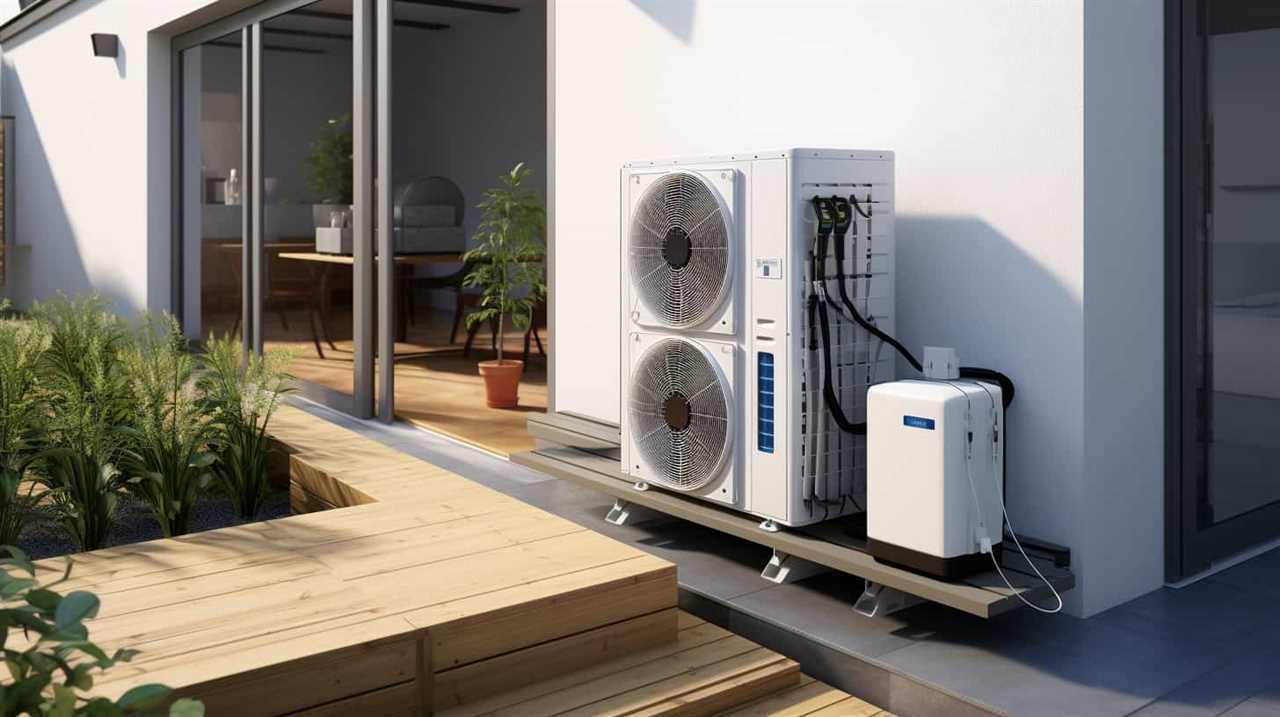
Regularly inspecting and adjusting thermostat settings is a simple yet effective way to ensure efficient operation and optimal comfort in commercial buildings.
Ensuring Proper Refrigerant Levels
We should regularly check and maintain proper refrigerant levels to ensure efficient operation of the heat pump system. Refrigerant is the lifeblood of the heat pump, responsible for absorbing and releasing heat to provide cooling or heating. Insufficient refrigerant levels can lead to decreased performance, higher energy consumption, and even system failure. On the other hand, overcharging the refrigerant can also cause problems, such as inefficient operation and potential damage to the compressor. To ensure proper refrigerant levels, it is essential to monitor and troubleshoot any refrigerant issues. This can be done through regular inspections and by consulting with a qualified HVAC technician who can measure and adjust the refrigerant levels according to the manufacturer’s specifications.
| Refrigerant Level Monitoring | Troubleshooting Refrigerant Issues |
|---|---|
| Regular inspections | Consult with HVAC technician |
| Measure refrigerant levels | Adjust levels as per specifications |
| Monitor system performance | Identify and fix leaks |
| Prevent overcharging | Ensure efficient operation |
Frequently Asked Questions
How Often Should I Schedule Maintenance for My Heat Pump?
We schedule professional heat pump maintenance regularly to ensure high efficiency. This includes cleaning the air filter to prevent clogs and optimize performance. Regular maintenance is key to maximizing the lifespan of your heat pump.
Can I Clean the Air Filters Myself, or Should I Hire a Professional?
Yes, you can clean the air filters yourself, but hiring a professional has benefits. We learned this the hard way when we damaged our heat pump while trying to clean the filters.
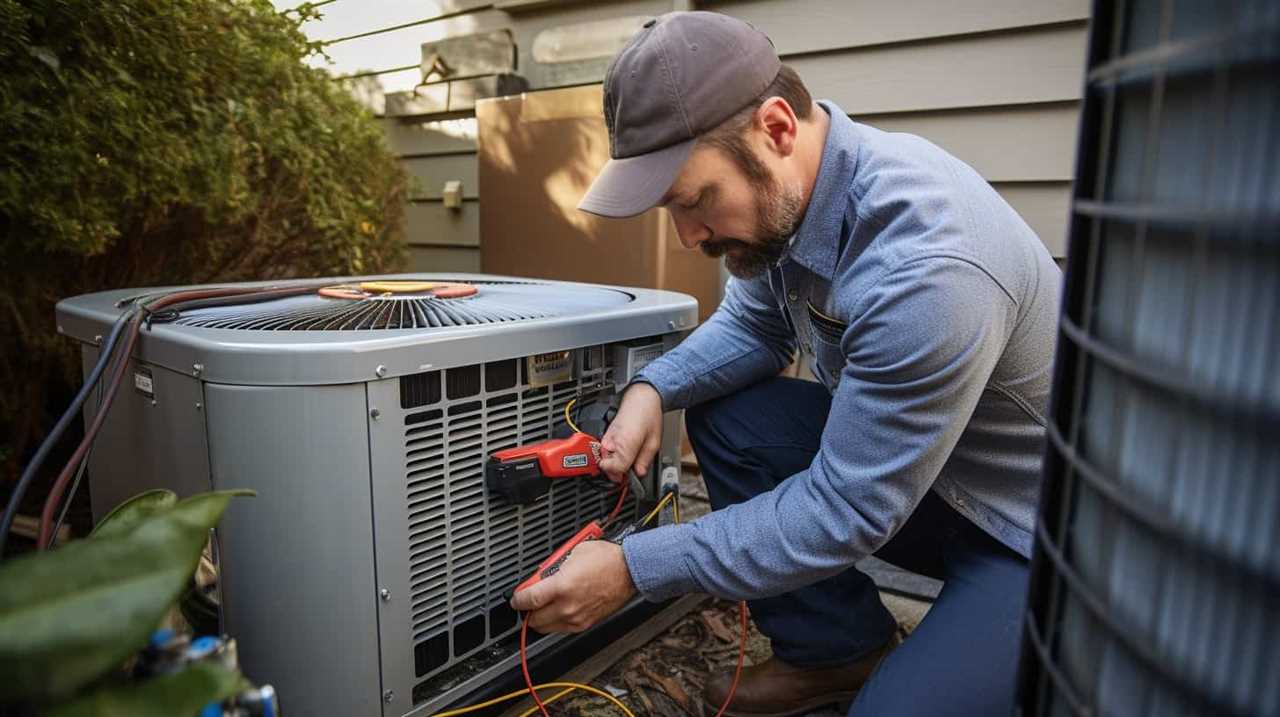
What Are the Signs That Indicate a Fan Motor May Need Lubrication?
When it comes to heat pump efficiency, fan motor maintenance is crucial. Signs like unusual noises or decreased performance can indicate the need for lubrication. Regularly lubricating the fan motor will help boost heat pump performance.
How Can I Determine if the Condensate Drain Is Clogged or Blocked?
To determine if the condensate drain is clogged or blocked, we can perform condensate drain troubleshooting. By regularly cleaning and maintaining the drain line, we can prevent condensate drain blockage and ensure optimal heat pump efficiency.
Is It Possible to Adjust Thermostat Settings to Optimize Energy Efficiency Without Sacrificing Comfort?
Yes, it is possible to adjust thermostat settings to optimize energy efficiency without sacrificing comfort. By setting the temperature lower in the winter and higher in the summer, you can save energy and reduce costs.
Conclusion
In conclusion, regular maintenance of heat pumps is essential for boosting commercial efficiency.

By cleaning and inspecting air filters, businesses can ensure optimal performance.
Checking and lubricating fan motors is another important step in maintaining heat pumps.
Clearing and inspecting condensate drains is also crucial for proper functioning.
Additionally, inspecting and adjusting thermostat settings and maintaining proper refrigerant levels are crucial.
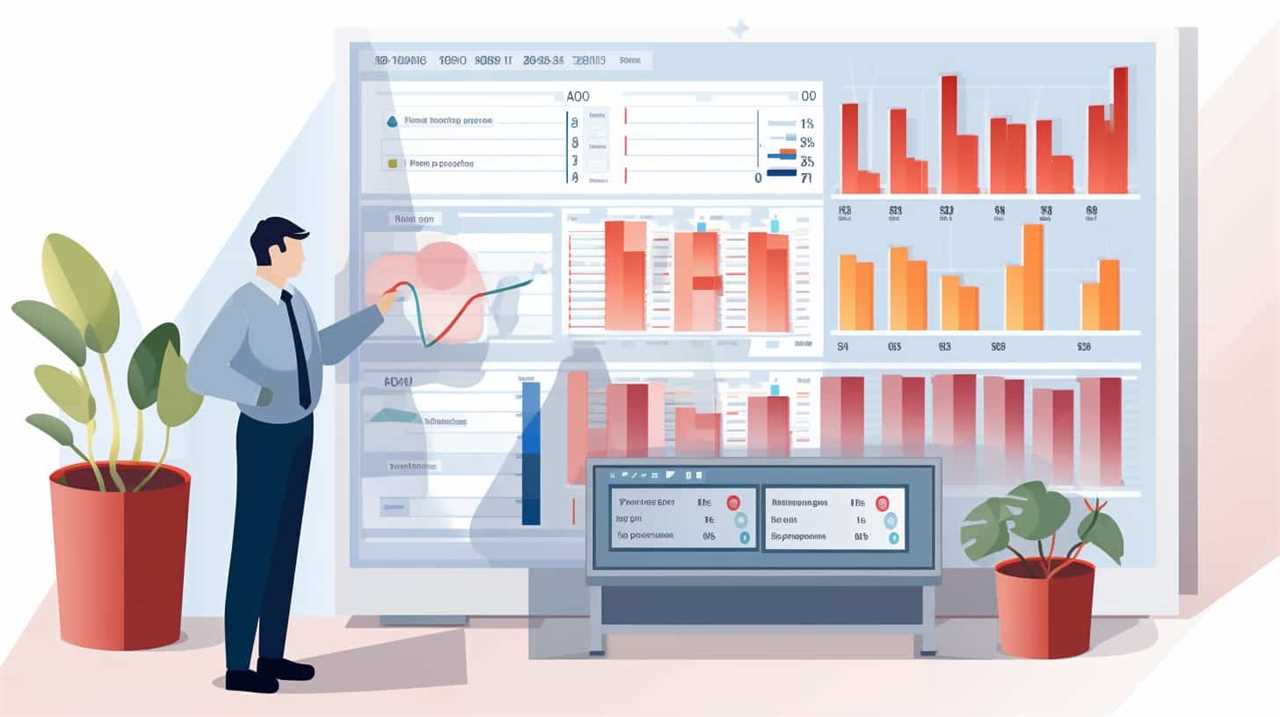
Remember, a well-maintained heat pump is like a well-oiled machine, keeping your business running smoothly and efficiently.
So, don’t overlook the importance of these maintenance tips for a more productive and cost-effective operation.









